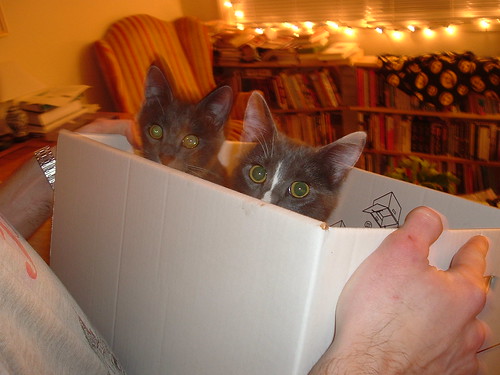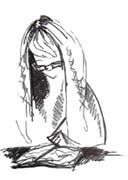
If you've talked to me for more than five minutes, we've probably talked about books. And if you've talked to me about books for more than five minutes, we've probably talked about
Everything is Illuminated. That is Jonathan Safran Foer's first novel, and it is amazing, and I tell absolutely everybody, regardless of personality, regular genre preference or reading level, to read it.
Everything is Illuminated. Jonathan Safran Foer. Here is a link to Amazon.com,
where you can buy a copy right now.
Everything is Illuminated more or less chronicles the journey of a young Jewish man (interestingly named Jonathan Safran Foer--but this is a novel, mind you) as he returns to the Ukraine to find the woman who saved his grandfather from the Nazis. That is only one facet of the plot. Also, there is Alex, his interpreter, whose broken English does many brilliant things for the English language. Here are the first few sentences of the book (from the first chapter, titled "An Overture to the Commencement of a Very Rigid Journey"), which immediately won me over:
My legal name is Alexander Perchov. But all of my many friends dub me Alex, because that is a more flaccid-to-utter version of my name. Mother dubs me Alexi-stop-spleening-me!, because I am always spleening her. If you want to know why I am always spleening her, it is because I am always elsewhere with friends, and dissemating so much currency, and performing so many things that can spleen a mother.
It only gets better from there. But also, there is the story of the village of Trachimbrod--all of these weave in and out, and create a complex plot that is beautiful and terrible at the same time. Never has a book made me giggle so madly out loud, and also cry--not sniffle, but
cry, snot and sobbing and all--in under three hundred pages.
Hoo doggie.
That said, you can imagine my sheer, uncontainable joy when I heard that he had a second novel out--the only thing that kept me from rushing out right then to buy it was my incurable frugality and my dislike of hardback books. I waited. And waited.
And went to Village Books last weekend to find that, after a whole year (dumb publishers), EXTREMELY LOUD & INCREDIBLY CLOSE was at last released in paperback.
I literally did a dance in the bookstore. A little shuffle, as a matter of fact, that vaguely resembled soft-shoe, but with some ecstatic little hops and kicks.
However, I've said nothing about the book so far. I will now:
Here is a link
where you can buy EXTREMELY LOUD & INCREDIBLE CLOSE (in paperback). I suggest you do it now.
Nine-year-old Oskar Schell finds a mysterious key that belonged to his father, who was killed in the World Trade Center on 9/11. He sets out to find the lock it belongs to. He searches all over New York with only one clue (the word "Black") to guide him.
That, more or less, is the story. But also, there is a family history, a missing grandfather, a grieving mother, the flickering memory of Oskar's father, and his grandmother. There is the bombing of Dresden. There are the people Oskar meets all over New York--his neighbor, who is 103-years-old; the woman who lives on the observation deck of the Empire State Building; the woman who is the 467th richest person in the world.
But it's no good summarizing this novel--too much happens, it is too layered and complex. I loved it, absolutely, and what I loved about it most was Foer's manner in looking directly at tragedy, terrible, terrible tragedy, with some small shred of hope. But of course I loved Oskar, who looks to Stephen Hawking as a role model, who knows about conjugating French verbs but doesn't know about Winston Churchill, and who can calculate in seconds exactly how many locks there are in New York city--how many per person, how many created each second.
Where he experimented with language in
Illuminated, Foer now adds visuals to his text--photographs, color, blank pages showing a single, well-said sentence. At first I was not sure that this worked, but now I am sure, and it did not take long to convince me. I think they are brilliant, those images.
Foer is only twenty-sevenish, by the way.
And his second novel did not dissappoint. I suppose, when the third novel comes around, I'll pass out in the bookstore from sheer joy, but until then, I'll go around recommending
Everything is Illuminated and EXTREMELY LOUD & INCREDIBLY CLOSE to everybody I know.
RATING: 5
 This is a novel of "grand proportions," I think. Certainly, WHITE TEETH is "astonishing," "dazzling," a real "tour-de-force"--one could even conceivably call this "the first great novel of the new century." All those phrases that have turned up on the dusk jackets of less deserving books, the phrases rendered meaningless by overuse (my dad and I recently looked up tour de force: "A feat requiring great virtuosity or strength, often deliberately undertaken for its difficulty: 'In an extraordinary structural tour de force the novel maintains a dual focus'"--you may note that the example cited is literary), apply to WHITE TEETH in the very best sort of way: what all those other "beguiling" novels attempt, WHITE TEETH succeeds at beautifully.
This is a novel of "grand proportions," I think. Certainly, WHITE TEETH is "astonishing," "dazzling," a real "tour-de-force"--one could even conceivably call this "the first great novel of the new century." All those phrases that have turned up on the dusk jackets of less deserving books, the phrases rendered meaningless by overuse (my dad and I recently looked up tour de force: "A feat requiring great virtuosity or strength, often deliberately undertaken for its difficulty: 'In an extraordinary structural tour de force the novel maintains a dual focus'"--you may note that the example cited is literary), apply to WHITE TEETH in the very best sort of way: what all those other "beguiling" novels attempt, WHITE TEETH succeeds at beautifully. I really wanted this book to knock my socks off. I did. But the only thing worse than admitting that it didn't is realizing that it might have, had I been in a slightly different frame of mind when I read SATURDAY.
I really wanted this book to knock my socks off. I did. But the only thing worse than admitting that it didn't is realizing that it might have, had I been in a slightly different frame of mind when I read SATURDAY. In 197_, Paul Theroux hopped on a train in Medford, Massachusettes, with an itch to see how far south the train would take him. A few months of tough train travel later, he found himself in Esquel, Patagonia--though obviously, he switched trains often, since no train runs top to bottom on both American continents. The idea was to travel all that distance without ever leaving the ground, since he states several times (and I have to say I agree) that air travel reduces a trip to its destination, rather than allowing it to be a coherent and vivid journey of scenery and experience. Nobody writes about the journey, Theroux protests.
In 197_, Paul Theroux hopped on a train in Medford, Massachusettes, with an itch to see how far south the train would take him. A few months of tough train travel later, he found himself in Esquel, Patagonia--though obviously, he switched trains often, since no train runs top to bottom on both American continents. The idea was to travel all that distance without ever leaving the ground, since he states several times (and I have to say I agree) that air travel reduces a trip to its destination, rather than allowing it to be a coherent and vivid journey of scenery and experience. Nobody writes about the journey, Theroux protests. If you've talked to me for more than five minutes, we've probably talked about books. And if you've talked to me about books for more than five minutes, we've probably talked about Everything is Illuminated. That is Jonathan Safran Foer's first novel, and it is amazing, and I tell absolutely everybody, regardless of personality, regular genre preference or reading level, to read it.
If you've talked to me for more than five minutes, we've probably talked about books. And if you've talked to me about books for more than five minutes, we've probably talked about Everything is Illuminated. That is Jonathan Safran Foer's first novel, and it is amazing, and I tell absolutely everybody, regardless of personality, regular genre preference or reading level, to read it. Although I'm not terribly fond of the word "potential," I think it must be used here. As in, "Wow, this book had such potential." See, it's subtitled An Accidental Soldier's Account of the War in Iraq, which pretty much sums up the intense and difficult material that Mr. Crawford is dealing with, and ordinarily I would be impressed that he confronted it so boldly and wrote about the things he saw and did and suffered in Iraq, accepting the possibility that plenty of people just won't understand.
Although I'm not terribly fond of the word "potential," I think it must be used here. As in, "Wow, this book had such potential." See, it's subtitled An Accidental Soldier's Account of the War in Iraq, which pretty much sums up the intense and difficult material that Mr. Crawford is dealing with, and ordinarily I would be impressed that he confronted it so boldly and wrote about the things he saw and did and suffered in Iraq, accepting the possibility that plenty of people just won't understand. I bet you didn't even know this was a book, huh?
I bet you didn't even know this was a book, huh? I had a long weekend this weekend, and so I was hungry for something trashy and absorbing.
I had a long weekend this weekend, and so I was hungry for something trashy and absorbing. The devil comes to Moscow. Chaos ensues. There's a bit of a love story, but mostly a long cast of characters (who are hard to keep straight because they're all Russian and so have five or six nicknames) meets an assortment of bad ends at the hands of the devil's wiley cohorts. It's a rowdy book, written during Stalin's Soviet regime (here are some
The devil comes to Moscow. Chaos ensues. There's a bit of a love story, but mostly a long cast of characters (who are hard to keep straight because they're all Russian and so have five or six nicknames) meets an assortment of bad ends at the hands of the devil's wiley cohorts. It's a rowdy book, written during Stalin's Soviet regime (here are some 
 Yup, it's a pretty little memoir, subtitled "Some True Stories From a Life", which I personally think is a terribly vague subtitle, but of course that's just me. It's not my book.
Yup, it's a pretty little memoir, subtitled "Some True Stories From a Life", which I personally think is a terribly vague subtitle, but of course that's just me. It's not my book.